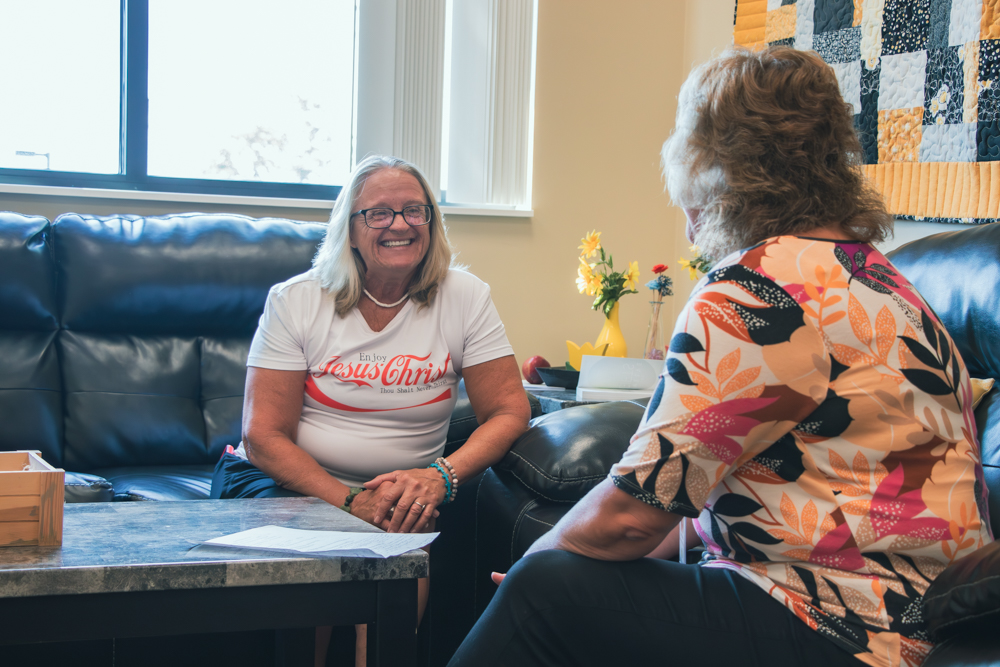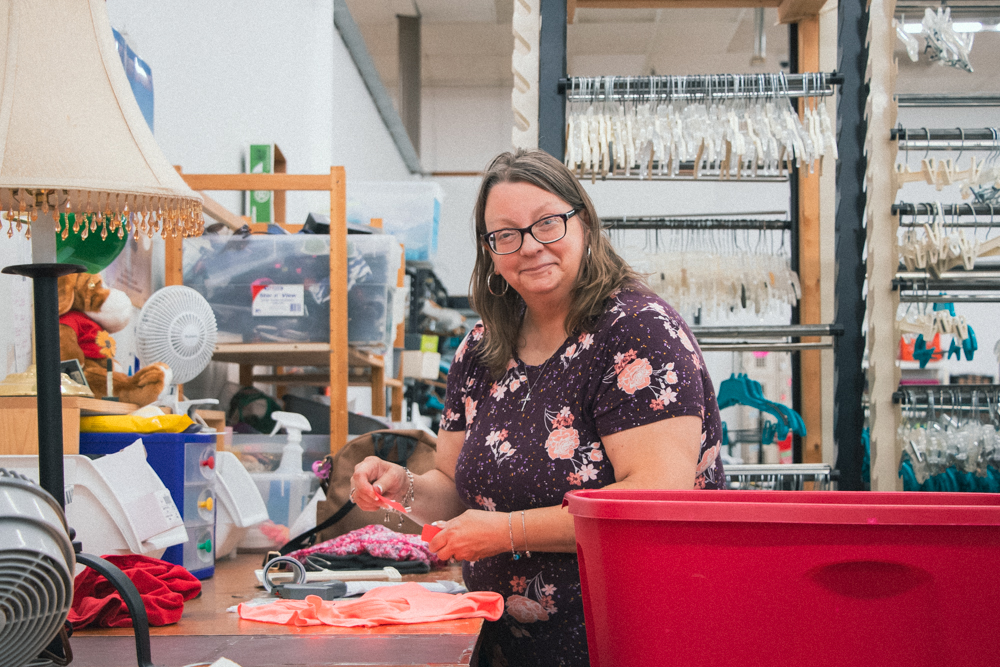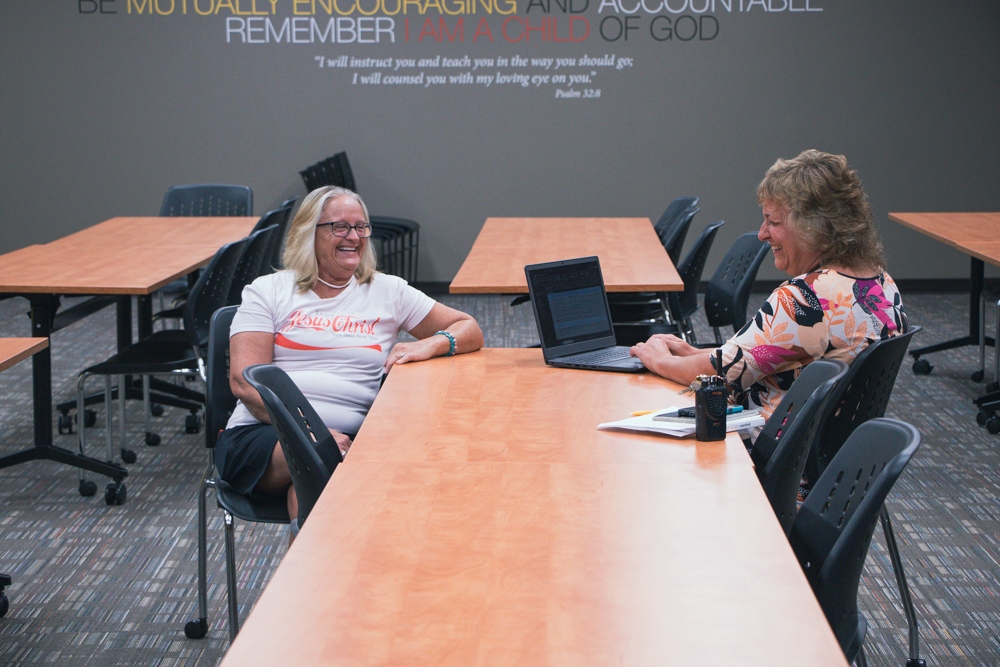
How Aftercare keeps Life Recovery grads on a path toward wholeness
In the Thrift Store processing area, Jolynn works her way through a bin full of donated women’s clothing. Each item gets priced, hung on a hanger and then on a rack. When the rack is full, she wheels it through a set of swinging doors and out to the sales floor, where she places the clothes on display. Retail isn’t new for Jolynn, 60. She has worked in grocery stores and at Walmart. But the feeling she brings to this job is definitely new. Before, a frustrating moment at a job would derail her whole life. Over and over. Last year, family members finally brought her to Rockford Rescue Mission—not with chemical addictions, but with emotional distress. “I’m a night-and-day different person now,” Jolynn says. “I was very angry when I came here. I didn’t want to be here. But I have so much more patience now, and so much more peace. I have God in my life now. I’m free.”

Vocational Training
Jolynn graduated from the Life Recovery Program in June, and now lives in our on-site transitional housing. Her job is a result of the Mission’s Advanced Vocational Training (AVT), which helps those entering our Aftercare program—designed to help them adjust to life again. Some grads work in Mission departments like Food Service, Facilities or Thrift Store. Others work for organizations that partner with us. For the Thrift Store, we’ve created several different training tracks. As with Jolynn’s case, any track can be customized to the person’s interests and abilities. Hers also has included administrative work in the Works! Center and now her job at Thrift Store.
“She has been such a blessing,” says Teresa Reeverts, who oversees the Works! Center in her role as the Mission’s Program Support Services Director. “She has just blossomed since she’s been here. And she really excels in customer service. Not everyone who comes in here, especially in the Crisis Center, is kind and happy to have help. And she really excelled.”
Lifetime Tools

AVT comes at the end of the Life Recovery Program and the beginning of Aftercare, where the Mission continues to keep tabs on graduates through both formal and informal means. Pam Tomita was appointed last year to the new position of Aftercare / Alumni Services Director. She brings a sense of urgency to the role; in the past several years, three of our Life Recovery graduates have relapsed and died of drug overdoses. All recovery programs, Christian or not, deal with this awful news sometimes. It’s a gut-punch.
“I am a critical thinker anyway,” Pam says. “So my thought was, are we giving them the best that we can offer them? Can we prevent those tragedies from happening? Probably not, because ultimately it’s their choice. But are we doing everything we can do?”
Pam thinks about all of the recovery tools residents receive, and how to help those stay front-of-mind in coping with everyday life again. The Genesis Process takes residents through 10 steps, using biblical principles to dig deep into their lives to find the root causes of their pain and move them toward healing.
“There’s a lot that they get through the Genesis Process,” she says. “Those are lifetime tools. But how many times do they just shut the book when they’re done with it, and they don’t remember or think about it?”
Currently, she meets one-to-one for 30 minutes each week with 17 men and women living in transitional housing. She asks questions like: How are you doing? How’s your job or school going? What things are you recognizing that could trigger destructive behaviors? What’s causing you anxiety and stress, and how are you managing it? The idea is to not let anyone confine those topics to their own minds. That’s when trouble can happen.
“Wherever they are struggling, that’s a focal point for conversation,” Pam says. “We also talk about false beliefs. A lot of them deal with low self-esteem or being capable of doing a job or to finish a class or even start something. We talk about that. I ask them, are you applying a Genesis tool to work against this? Or a Scripture? And then we always end with prayer.”
“We require them to be a part of a church and have a spiritual mentor, so that’s also something we focus on—trying to get them connected outside of the Mission as well.”
At six months out of the program, the meetings scale back to once every two weeks. After a year, and when the grads have moved out of the Mission, it’s once a month for another year or two.
Building Hope
The Mission is adding a new stage — Job Readiness — to the Life Recovery Program. This lets our residents take the recovery tools they’ve learned in the Genesis Process, and put them into practice as they adjust to life outside the Mission.
“So for instance, three days a week they would work at the job, and one day a week they would work with me, and I would teach classes about how their integrity is going on the job,” Pam says. “How are they remaining sober while dealing with job stress? Works! Center then would have them for another day and they would work on resume-building, cover letters, strengths and skills.”
And that’s the point of Aftercare: continuing to build confidence and hope, while helping people steer away from those old, destructive patterns.
“That’s how I see God really working through the vocational programs,” Teresa says. “You have to get in there and walk beside people, to give them that confidence again to go live their life, to go explore other things.”
As for Jolynn, she has set her sights on finding housing of her own, and continuing to succeed in retail and administrative work.
“I need to stand on my own two feet now,” she says. “And with the help of the Lord, I can do it.”




